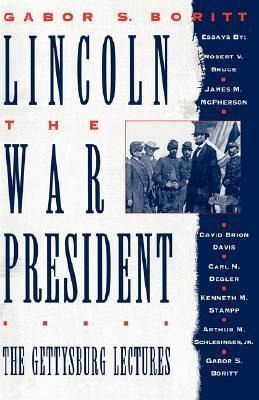
Lincoln, the War President
The Gettysburg Lectures
Herausgeber: Boritt, G. S.
Versandkostenfrei!
Versandfertig in 1-2 Wochen
37,99 €
inkl. MwSt.

PAYBACK Punkte
19 °P sammeln!
Gabor Boritt traces Lincoln's transition from strident opponent of the Mexican War, to resolute war leader, ("Destroy the rebel army," were his terse orders) to speaking out for reconciliation (after Appomattox he exclaimed, "Enemies, never again must we repeat that word"). Carl Degler compares the Civil War as a successful attempt at true national unification with the unifications of Italy, Germany, and even Switzerland (which waged a fraternal war not many years earlier). Robert Bruce provides an incisive look at the premonitions of civil war that haunted the American republic since independence, including Lincoln's reluctance to accept war as a possibility. And James McPherson establishes once and for all Lincoln's brilliance as a national strategist. Historians have often criticized specific military decisions Lincoln made, McPherson writes, ignoring his grasp of an overall national strategy that calculated political, economic, and military needs together. These outstanding essays - all but one published here for the first tiem - offer a new understanding of a revolutionary epoch in American history, and of the role of the leader who helped transform the nation forever.
"Americans interested in history need to make the pilgrimage to Gettysburg," writes Gabor Boritt in the Acknowledgments. In this book seven historians make that journey, five of them Pulitzer laureates, looking for Lincoln. Kenneth Stampp explores the issue of national self-determination, comparing the South's struggle for independence to others in history (including the post-Soviets in eastern Europe). Arthur Schlessinger, Jr. offers a provocative comparison of how Lincoln and our other outstanding war president, FDR, went beyond the limits of the Constitution--and why. David Brion Davis focuses on the moment of emancipation. Boritt traces Lincoln's transition from a strident war opponent as a young man to resolute war leader as president. Carl Degler compares the American attempt at national unification with the unifications of Italy, Germany, and other nations. Robert Bruce contrasts premonitions of civil war with Lincoln's reluctance to accept war as a possibility. And James McPherson establishes once and for all the war president's brilliance as a national strategist. These outstanding essays--all but one published here for the first time--offer a new understanding of a revolutionary epoch in American history, and of the role of the leader who helped transform the nation forever.




